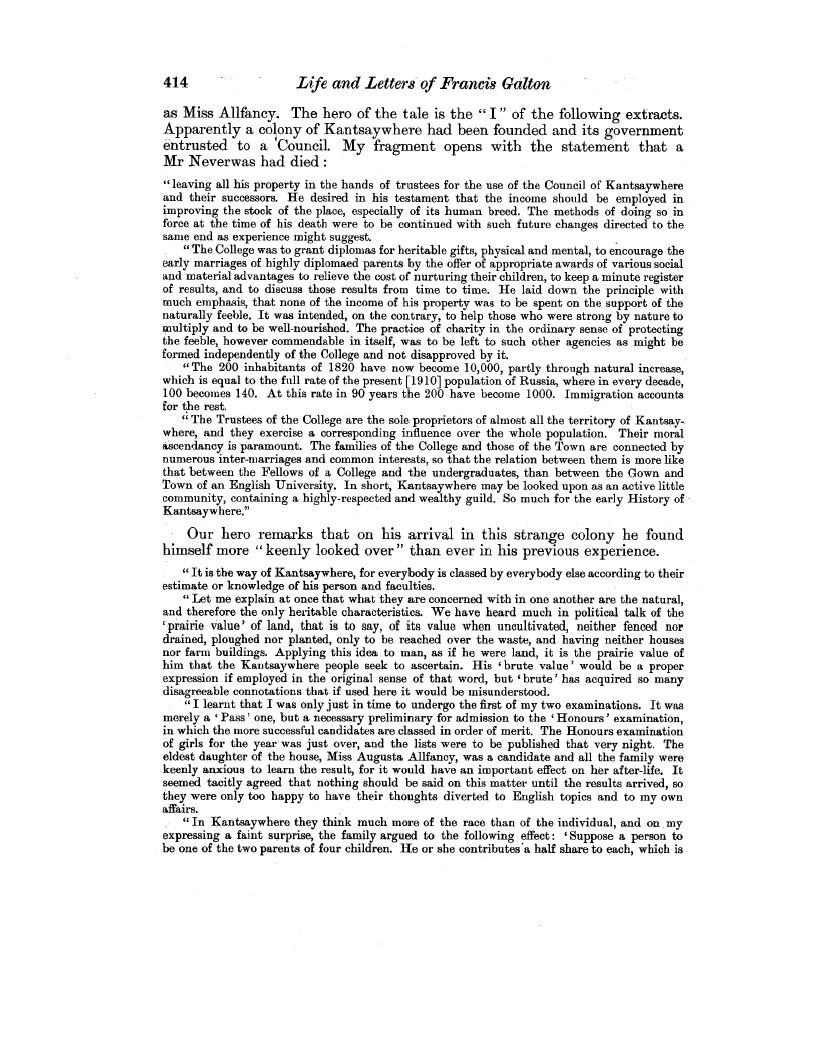| ||||||

OCR Rendition - approximate
414 Life and Letters of Francis Galton as Miss Allfancy. The hero of the tale is the " I " of the following extracts. Apparently a colony of Kantsaywhere had been founded and its government entrusted to a `Council. My fragment opens with the statement that a Mr Neverwas had died "leaving all his property in the hands of trustees for the use of the Council of Kantsaywhere and their successors. He desired in his testament that the income should be employed in improving the stock of the place, especially of its human breed. The methods of doing so in force at the time of his death were to be continued with such future changes directed to the same end as experience might suggest. " The College was to grant diplomas for heritable gifts, physical and mental, to encourage the early marriages of highly diplomaed parents by the offer of appropriate awards of various social and material advantages to relieve the cost of nurturing their children, to keep a minute register of results, and to discuss those results from time to time. He laid down the principle with much emphasis, that none of the income of his property was to be spent on the support of the naturally feeble. It was intended, on the contrary, to help those who were strong by nature to multiply and to be well-nourished. The practice of charity in the ordinary sense of protecting the feeble, however commendable in itself, was to be left to such other agencies as might be formed independently of the College and not disapproved by it. " The 200 inhabitants of 1820 have now become 10,000, partly through natural increase, which is equal to the full rate of the present [1910] population of Russia, where in every decade, 100 becomes 140. At this rate in 90 years the 200 have become 1000. Immigration accounts for the rest. " The Trustees of the College are the sole proprietors of almost all the territory of Kantsay-, where, and they exercise a corresponding influence over the whole population. Their moral ascendancy is paramount. The families of the College and those of the Town are connected by numerous inter-marriages and common interests, so that the relation between them is more like that between the Fellows of a College and the undergraduates, than between the Gown and Town of an English University. In short, Kantsaywhere may be looked upon as an active little community, containing a highly-respected and wealthy guild. So much for the early History of Kantsaywhere." Our hero remarks that on his arrival in this strange colony he found himself more " keenly looked over " than ever in his previous experience. " It is the way of Kantsaywhere, for everybody is classed by everybody else according to their estimate or knowledge of his person and faculties. " Let me explain at once that what they are concerned with in one another are the natural, and therefore the only heritable characteristics. We have heard much in political talk of the ' prairie value' of land, that is to say, of its value when uncultivated, neither fenced nor drained, ploughed nor planted, only to be reached over the waste, and having neither houses nor farm buildings. Applying this idea to man, as if he were land, it is the prairie value of him that the Kautsaywhere people seek to ascertain. His 'brute value' would be a proper expression if employed in the original sense of that word, but ' brute' has acquired so many disagreeable connotations that if used here it would be misunderstood. "I learnt that I was only just in time to undergo the first of my two examinations. It was merely a 'Pass' one, but a necessary preliminary for admission to the 'Honours' examination, in which the more successful candidates are classed in order of merit. The Honours examination of girls for the year was just over, and the lists were to be published that very night. The eldest daughter of the house, Miss Augusta Allfancy, was a candidate and all the family were keenly anxious to learn the result, for it would have an important effect on her after-life. It seemed tacitly agreed that nothing should be said on this matter until the results arrived, so they were only too happy to have their thoughts diverted to English topics and to my own affairs. "In Kantsaywhere they think much more of the race than of the individual, and on my expressing a faint surprise, the family argued to the following effect : ' Suppose a person to be one of the two parents of four children. He or she contributes *a half share to each, which is
|